International Finance: Challenges, Derivatives, and Protection
VerifiedAdded on 2023/01/12
|11
|3576
|48
AI Summary
This document discusses the challenges faced in international finance, particularly in relation to the International Monetary Fund (IMF). It also explores the role of derivatives in theory and how they can protect against the failings of Purchasing Power Parity (PPP) and International Fisher Effect (IFE).
Contribute Materials
Your contribution can guide someone’s learning journey. Share your
documents today.
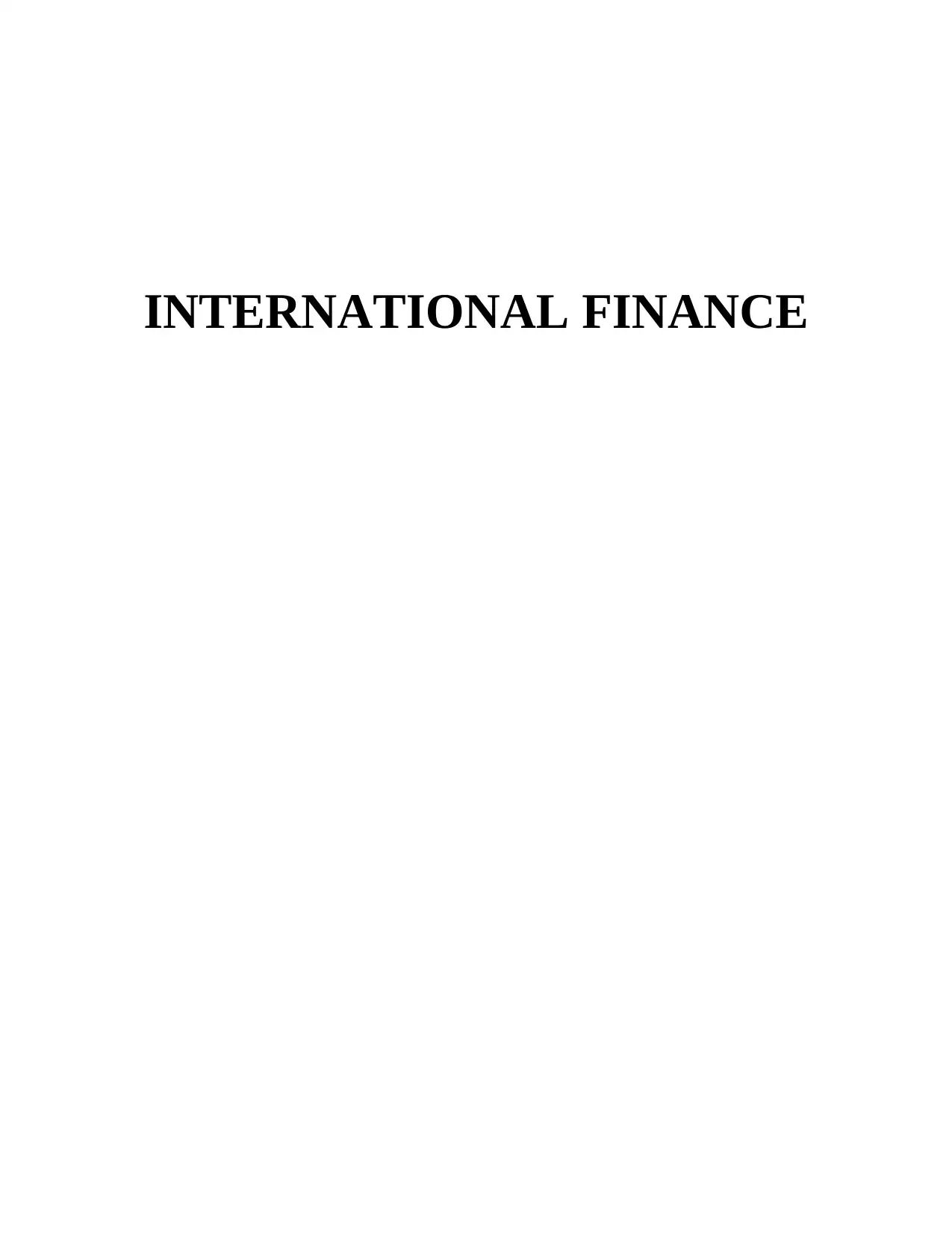
INTERNATIONAL FINANCE
Secure Best Marks with AI Grader
Need help grading? Try our AI Grader for instant feedback on your assignments.
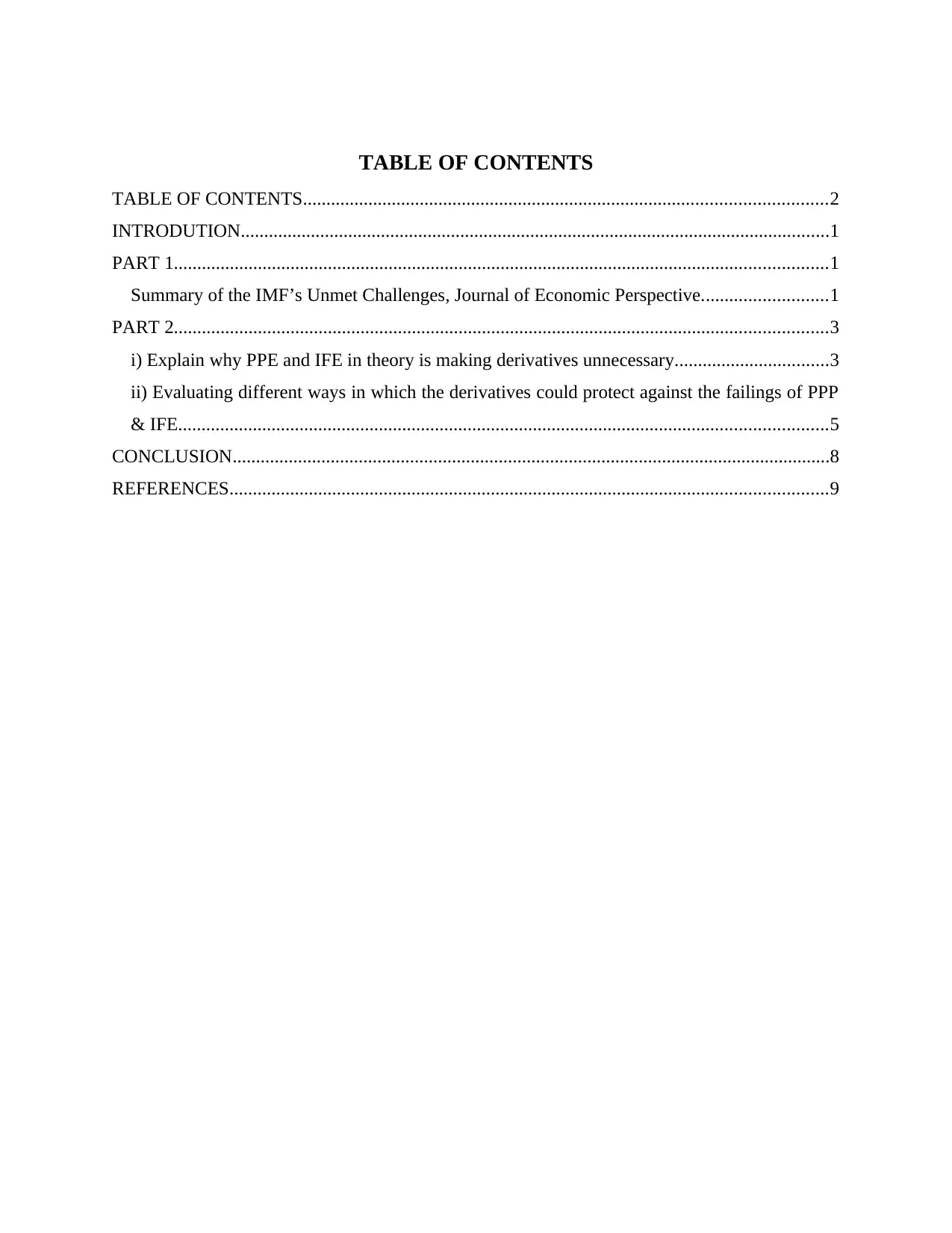
TABLE OF CONTENTS
TABLE OF CONTENTS................................................................................................................2
INTRODUTION..............................................................................................................................1
PART 1............................................................................................................................................1
Summary of the IMF’s Unmet Challenges, Journal of Economic Perspective...........................1
PART 2............................................................................................................................................3
i) Explain why PPE and IFE in theory is making derivatives unnecessary.................................3
ii) Evaluating different ways in which the derivatives could protect against the failings of PPP
& IFE...........................................................................................................................................5
CONCLUSION................................................................................................................................8
REFERENCES................................................................................................................................9
TABLE OF CONTENTS................................................................................................................2
INTRODUTION..............................................................................................................................1
PART 1............................................................................................................................................1
Summary of the IMF’s Unmet Challenges, Journal of Economic Perspective...........................1
PART 2............................................................................................................................................3
i) Explain why PPE and IFE in theory is making derivatives unnecessary.................................3
ii) Evaluating different ways in which the derivatives could protect against the failings of PPP
& IFE...........................................................................................................................................5
CONCLUSION................................................................................................................................8
REFERENCES................................................................................................................................9
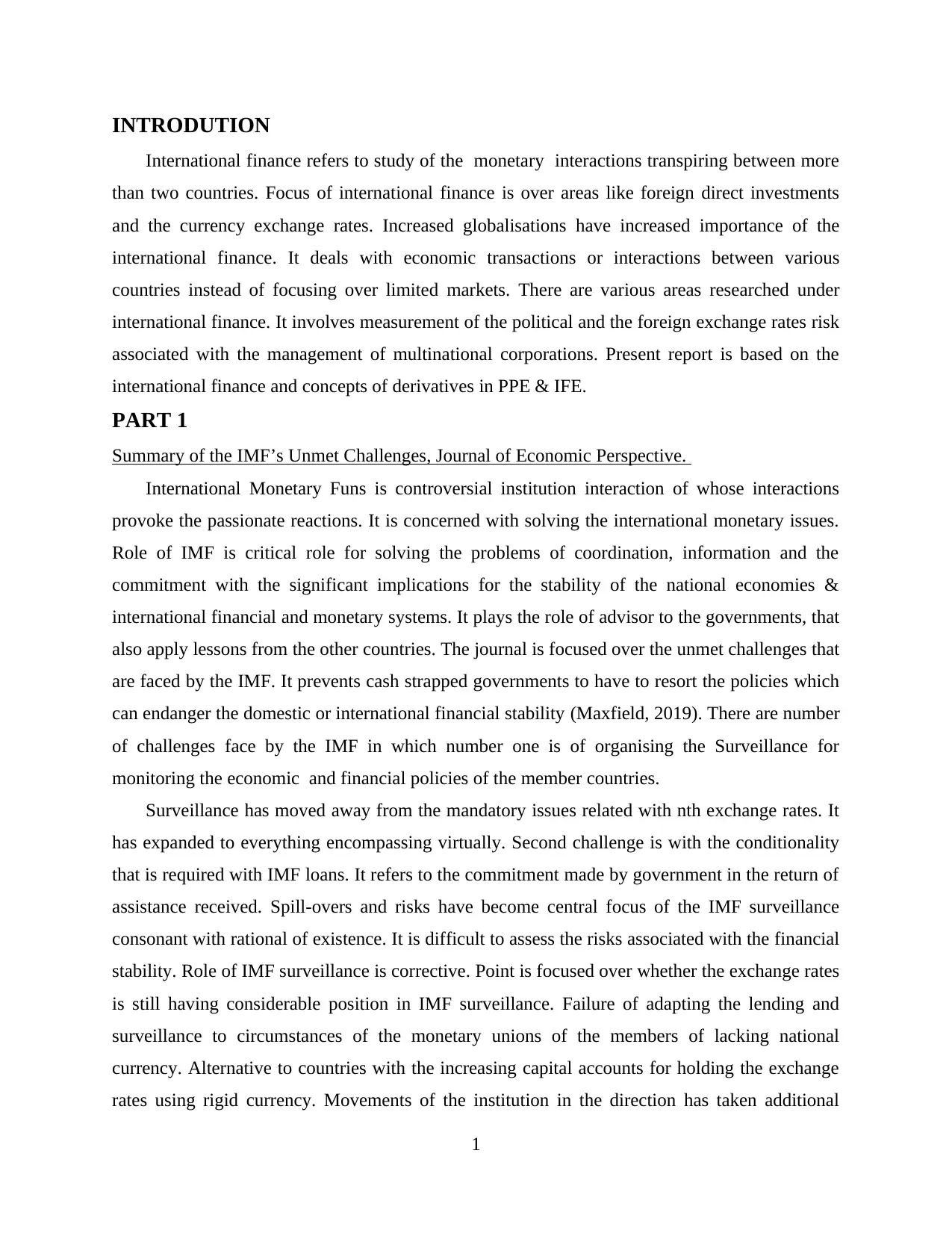
INTRODUTION
International finance refers to study of the monetary interactions transpiring between more
than two countries. Focus of international finance is over areas like foreign direct investments
and the currency exchange rates. Increased globalisations have increased importance of the
international finance. It deals with economic transactions or interactions between various
countries instead of focusing over limited markets. There are various areas researched under
international finance. It involves measurement of the political and the foreign exchange rates risk
associated with the management of multinational corporations. Present report is based on the
international finance and concepts of derivatives in PPE & IFE.
PART 1
Summary of the IMF’s Unmet Challenges, Journal of Economic Perspective.
International Monetary Funs is controversial institution interaction of whose interactions
provoke the passionate reactions. It is concerned with solving the international monetary issues.
Role of IMF is critical role for solving the problems of coordination, information and the
commitment with the significant implications for the stability of the national economies &
international financial and monetary systems. It plays the role of advisor to the governments, that
also apply lessons from the other countries. The journal is focused over the unmet challenges that
are faced by the IMF. It prevents cash strapped governments to have to resort the policies which
can endanger the domestic or international financial stability (Maxfield, 2019). There are number
of challenges face by the IMF in which number one is of organising the Surveillance for
monitoring the economic and financial policies of the member countries.
Surveillance has moved away from the mandatory issues related with nth exchange rates. It
has expanded to everything encompassing virtually. Second challenge is with the conditionality
that is required with IMF loans. It refers to the commitment made by government in the return of
assistance received. Spill-overs and risks have become central focus of the IMF surveillance
consonant with rational of existence. It is difficult to assess the risks associated with the financial
stability. Role of IMF surveillance is corrective. Point is focused over whether the exchange rates
is still having considerable position in IMF surveillance. Failure of adapting the lending and
surveillance to circumstances of the monetary unions of the members of lacking national
currency. Alternative to countries with the increasing capital accounts for holding the exchange
rates using rigid currency. Movements of the institution in the direction has taken additional
1
International finance refers to study of the monetary interactions transpiring between more
than two countries. Focus of international finance is over areas like foreign direct investments
and the currency exchange rates. Increased globalisations have increased importance of the
international finance. It deals with economic transactions or interactions between various
countries instead of focusing over limited markets. There are various areas researched under
international finance. It involves measurement of the political and the foreign exchange rates risk
associated with the management of multinational corporations. Present report is based on the
international finance and concepts of derivatives in PPE & IFE.
PART 1
Summary of the IMF’s Unmet Challenges, Journal of Economic Perspective.
International Monetary Funs is controversial institution interaction of whose interactions
provoke the passionate reactions. It is concerned with solving the international monetary issues.
Role of IMF is critical role for solving the problems of coordination, information and the
commitment with the significant implications for the stability of the national economies &
international financial and monetary systems. It plays the role of advisor to the governments, that
also apply lessons from the other countries. The journal is focused over the unmet challenges that
are faced by the IMF. It prevents cash strapped governments to have to resort the policies which
can endanger the domestic or international financial stability (Maxfield, 2019). There are number
of challenges face by the IMF in which number one is of organising the Surveillance for
monitoring the economic and financial policies of the member countries.
Surveillance has moved away from the mandatory issues related with nth exchange rates. It
has expanded to everything encompassing virtually. Second challenge is with the conditionality
that is required with IMF loans. It refers to the commitment made by government in the return of
assistance received. Spill-overs and risks have become central focus of the IMF surveillance
consonant with rational of existence. It is difficult to assess the risks associated with the financial
stability. Role of IMF surveillance is corrective. Point is focused over whether the exchange rates
is still having considerable position in IMF surveillance. Failure of adapting the lending and
surveillance to circumstances of the monetary unions of the members of lacking national
currency. Alternative to countries with the increasing capital accounts for holding the exchange
rates using rigid currency. Movements of the institution in the direction has taken additional
1
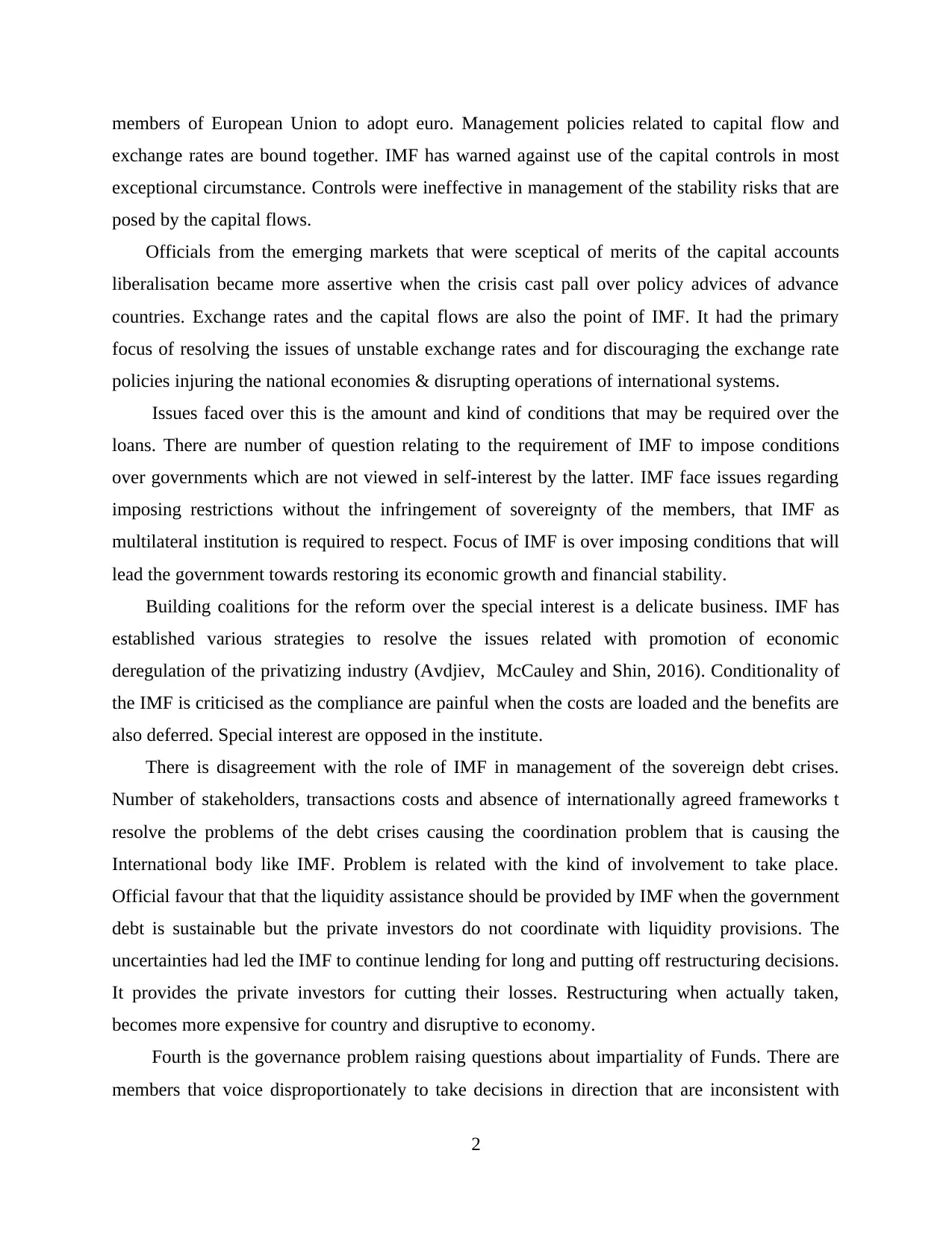
members of European Union to adopt euro. Management policies related to capital flow and
exchange rates are bound together. IMF has warned against use of the capital controls in most
exceptional circumstance. Controls were ineffective in management of the stability risks that are
posed by the capital flows.
Officials from the emerging markets that were sceptical of merits of the capital accounts
liberalisation became more assertive when the crisis cast pall over policy advices of advance
countries. Exchange rates and the capital flows are also the point of IMF. It had the primary
focus of resolving the issues of unstable exchange rates and for discouraging the exchange rate
policies injuring the national economies & disrupting operations of international systems.
Issues faced over this is the amount and kind of conditions that may be required over the
loans. There are number of question relating to the requirement of IMF to impose conditions
over governments which are not viewed in self-interest by the latter. IMF face issues regarding
imposing restrictions without the infringement of sovereignty of the members, that IMF as
multilateral institution is required to respect. Focus of IMF is over imposing conditions that will
lead the government towards restoring its economic growth and financial stability.
Building coalitions for the reform over the special interest is a delicate business. IMF has
established various strategies to resolve the issues related with promotion of economic
deregulation of the privatizing industry (Avdjiev, McCauley and Shin, 2016). Conditionality of
the IMF is criticised as the compliance are painful when the costs are loaded and the benefits are
also deferred. Special interest are opposed in the institute.
There is disagreement with the role of IMF in management of the sovereign debt crises.
Number of stakeholders, transactions costs and absence of internationally agreed frameworks t
resolve the problems of the debt crises causing the coordination problem that is causing the
International body like IMF. Problem is related with the kind of involvement to take place.
Official favour that that the liquidity assistance should be provided by IMF when the government
debt is sustainable but the private investors do not coordinate with liquidity provisions. The
uncertainties had led the IMF to continue lending for long and putting off restructuring decisions.
It provides the private investors for cutting their losses. Restructuring when actually taken,
becomes more expensive for country and disruptive to economy.
Fourth is the governance problem raising questions about impartiality of Funds. There are
members that voice disproportionately to take decisions in direction that are inconsistent with
2
exchange rates are bound together. IMF has warned against use of the capital controls in most
exceptional circumstance. Controls were ineffective in management of the stability risks that are
posed by the capital flows.
Officials from the emerging markets that were sceptical of merits of the capital accounts
liberalisation became more assertive when the crisis cast pall over policy advices of advance
countries. Exchange rates and the capital flows are also the point of IMF. It had the primary
focus of resolving the issues of unstable exchange rates and for discouraging the exchange rate
policies injuring the national economies & disrupting operations of international systems.
Issues faced over this is the amount and kind of conditions that may be required over the
loans. There are number of question relating to the requirement of IMF to impose conditions
over governments which are not viewed in self-interest by the latter. IMF face issues regarding
imposing restrictions without the infringement of sovereignty of the members, that IMF as
multilateral institution is required to respect. Focus of IMF is over imposing conditions that will
lead the government towards restoring its economic growth and financial stability.
Building coalitions for the reform over the special interest is a delicate business. IMF has
established various strategies to resolve the issues related with promotion of economic
deregulation of the privatizing industry (Avdjiev, McCauley and Shin, 2016). Conditionality of
the IMF is criticised as the compliance are painful when the costs are loaded and the benefits are
also deferred. Special interest are opposed in the institute.
There is disagreement with the role of IMF in management of the sovereign debt crises.
Number of stakeholders, transactions costs and absence of internationally agreed frameworks t
resolve the problems of the debt crises causing the coordination problem that is causing the
International body like IMF. Problem is related with the kind of involvement to take place.
Official favour that that the liquidity assistance should be provided by IMF when the government
debt is sustainable but the private investors do not coordinate with liquidity provisions. The
uncertainties had led the IMF to continue lending for long and putting off restructuring decisions.
It provides the private investors for cutting their losses. Restructuring when actually taken,
becomes more expensive for country and disruptive to economy.
Fourth is the governance problem raising questions about impartiality of Funds. There are
members that voice disproportionately to take decisions in direction that are inconsistent with
2
Secure Best Marks with AI Grader
Need help grading? Try our AI Grader for instant feedback on your assignments.
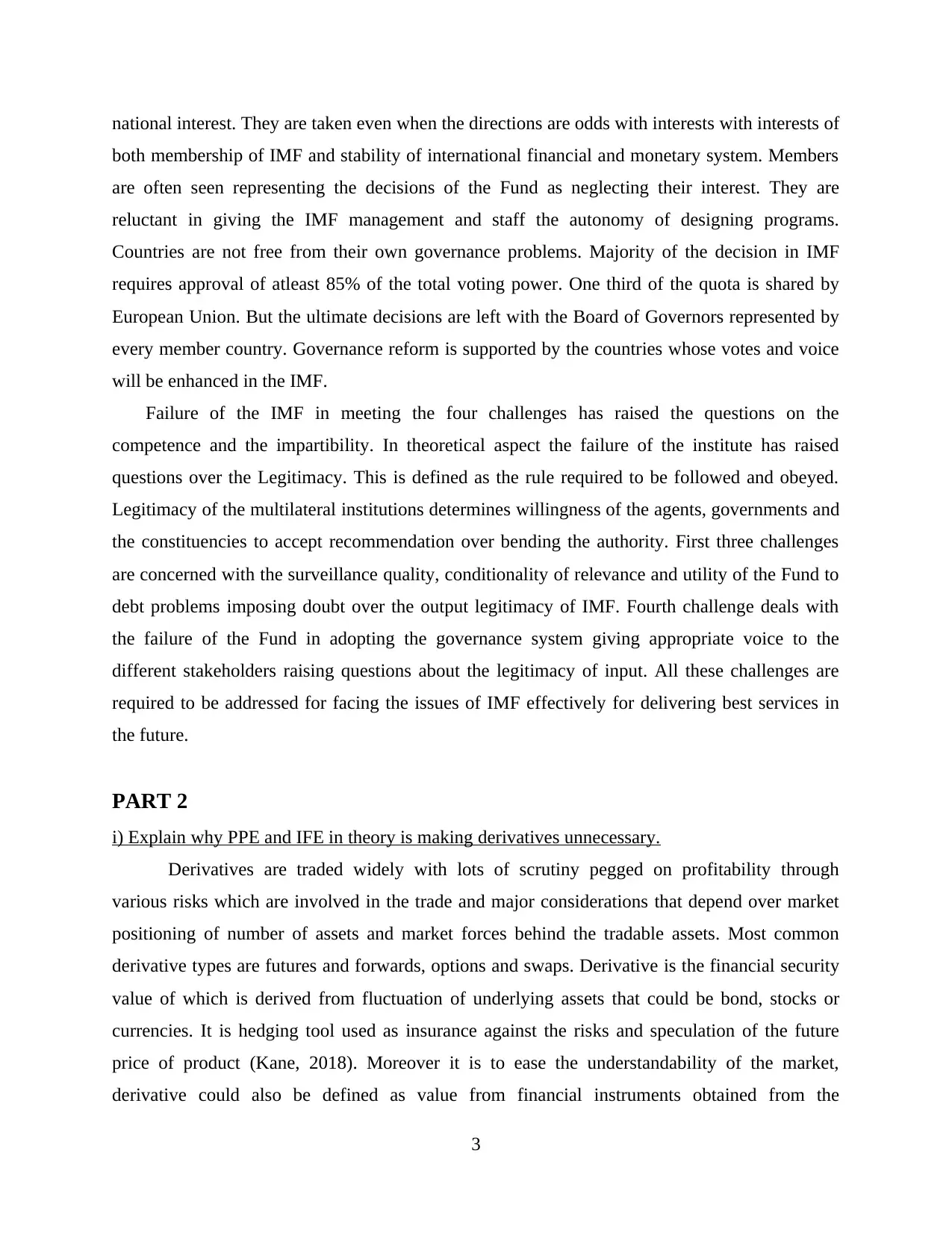
national interest. They are taken even when the directions are odds with interests with interests of
both membership of IMF and stability of international financial and monetary system. Members
are often seen representing the decisions of the Fund as neglecting their interest. They are
reluctant in giving the IMF management and staff the autonomy of designing programs.
Countries are not free from their own governance problems. Majority of the decision in IMF
requires approval of atleast 85% of the total voting power. One third of the quota is shared by
European Union. But the ultimate decisions are left with the Board of Governors represented by
every member country. Governance reform is supported by the countries whose votes and voice
will be enhanced in the IMF.
Failure of the IMF in meeting the four challenges has raised the questions on the
competence and the impartibility. In theoretical aspect the failure of the institute has raised
questions over the Legitimacy. This is defined as the rule required to be followed and obeyed.
Legitimacy of the multilateral institutions determines willingness of the agents, governments and
the constituencies to accept recommendation over bending the authority. First three challenges
are concerned with the surveillance quality, conditionality of relevance and utility of the Fund to
debt problems imposing doubt over the output legitimacy of IMF. Fourth challenge deals with
the failure of the Fund in adopting the governance system giving appropriate voice to the
different stakeholders raising questions about the legitimacy of input. All these challenges are
required to be addressed for facing the issues of IMF effectively for delivering best services in
the future.
PART 2
i) Explain why PPE and IFE in theory is making derivatives unnecessary.
Derivatives are traded widely with lots of scrutiny pegged on profitability through
various risks which are involved in the trade and major considerations that depend over market
positioning of number of assets and market forces behind the tradable assets. Most common
derivative types are futures and forwards, options and swaps. Derivative is the financial security
value of which is derived from fluctuation of underlying assets that could be bond, stocks or
currencies. It is hedging tool used as insurance against the risks and speculation of the future
price of product (Kane, 2018). Moreover it is to ease the understandability of the market,
derivative could also be defined as value from financial instruments obtained from the
3
both membership of IMF and stability of international financial and monetary system. Members
are often seen representing the decisions of the Fund as neglecting their interest. They are
reluctant in giving the IMF management and staff the autonomy of designing programs.
Countries are not free from their own governance problems. Majority of the decision in IMF
requires approval of atleast 85% of the total voting power. One third of the quota is shared by
European Union. But the ultimate decisions are left with the Board of Governors represented by
every member country. Governance reform is supported by the countries whose votes and voice
will be enhanced in the IMF.
Failure of the IMF in meeting the four challenges has raised the questions on the
competence and the impartibility. In theoretical aspect the failure of the institute has raised
questions over the Legitimacy. This is defined as the rule required to be followed and obeyed.
Legitimacy of the multilateral institutions determines willingness of the agents, governments and
the constituencies to accept recommendation over bending the authority. First three challenges
are concerned with the surveillance quality, conditionality of relevance and utility of the Fund to
debt problems imposing doubt over the output legitimacy of IMF. Fourth challenge deals with
the failure of the Fund in adopting the governance system giving appropriate voice to the
different stakeholders raising questions about the legitimacy of input. All these challenges are
required to be addressed for facing the issues of IMF effectively for delivering best services in
the future.
PART 2
i) Explain why PPE and IFE in theory is making derivatives unnecessary.
Derivatives are traded widely with lots of scrutiny pegged on profitability through
various risks which are involved in the trade and major considerations that depend over market
positioning of number of assets and market forces behind the tradable assets. Most common
derivative types are futures and forwards, options and swaps. Derivative is the financial security
value of which is derived from fluctuation of underlying assets that could be bond, stocks or
currencies. It is hedging tool used as insurance against the risks and speculation of the future
price of product (Kane, 2018). Moreover it is to ease the understandability of the market,
derivative could also be defined as value from financial instruments obtained from the
3
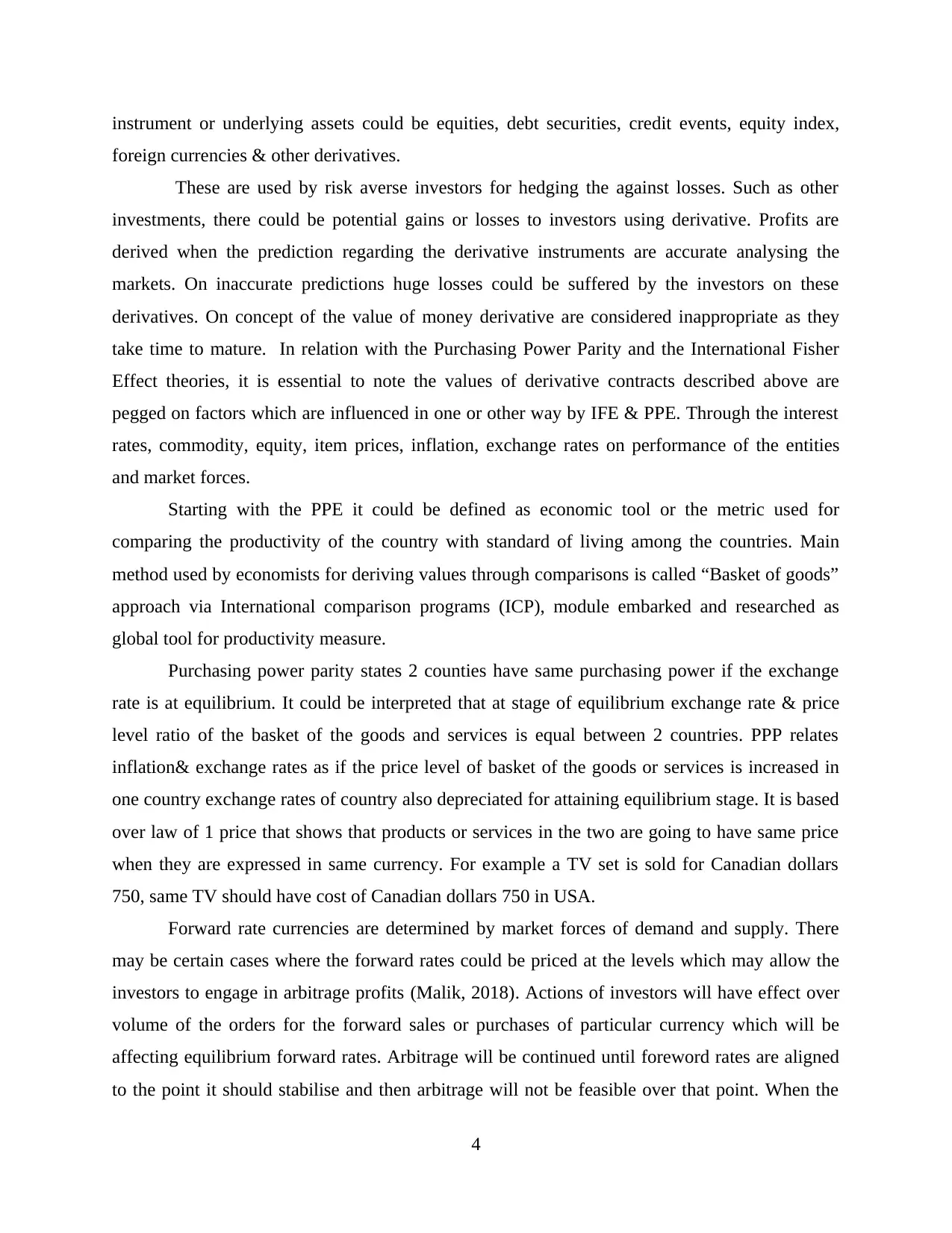
instrument or underlying assets could be equities, debt securities, credit events, equity index,
foreign currencies & other derivatives.
These are used by risk averse investors for hedging the against losses. Such as other
investments, there could be potential gains or losses to investors using derivative. Profits are
derived when the prediction regarding the derivative instruments are accurate analysing the
markets. On inaccurate predictions huge losses could be suffered by the investors on these
derivatives. On concept of the value of money derivative are considered inappropriate as they
take time to mature. In relation with the Purchasing Power Parity and the International Fisher
Effect theories, it is essential to note the values of derivative contracts described above are
pegged on factors which are influenced in one or other way by IFE & PPE. Through the interest
rates, commodity, equity, item prices, inflation, exchange rates on performance of the entities
and market forces.
Starting with the PPE it could be defined as economic tool or the metric used for
comparing the productivity of the country with standard of living among the countries. Main
method used by economists for deriving values through comparisons is called “Basket of goods”
approach via International comparison programs (ICP), module embarked and researched as
global tool for productivity measure.
Purchasing power parity states 2 counties have same purchasing power if the exchange
rate is at equilibrium. It could be interpreted that at stage of equilibrium exchange rate & price
level ratio of the basket of the goods and services is equal between 2 countries. PPP relates
inflation& exchange rates as if the price level of basket of the goods or services is increased in
one country exchange rates of country also depreciated for attaining equilibrium stage. It is based
over law of 1 price that shows that products or services in the two are going to have same price
when they are expressed in same currency. For example a TV set is sold for Canadian dollars
750, same TV should have cost of Canadian dollars 750 in USA.
Forward rate currencies are determined by market forces of demand and supply. There
may be certain cases where the forward rates could be priced at the levels which may allow the
investors to engage in arbitrage profits (Malik, 2018). Actions of investors will have effect over
volume of the orders for the forward sales or purchases of particular currency which will be
affecting equilibrium forward rates. Arbitrage will be continued until foreword rates are aligned
to the point it should stabilise and then arbitrage will not be feasible over that point. When the
4
foreign currencies & other derivatives.
These are used by risk averse investors for hedging the against losses. Such as other
investments, there could be potential gains or losses to investors using derivative. Profits are
derived when the prediction regarding the derivative instruments are accurate analysing the
markets. On inaccurate predictions huge losses could be suffered by the investors on these
derivatives. On concept of the value of money derivative are considered inappropriate as they
take time to mature. In relation with the Purchasing Power Parity and the International Fisher
Effect theories, it is essential to note the values of derivative contracts described above are
pegged on factors which are influenced in one or other way by IFE & PPE. Through the interest
rates, commodity, equity, item prices, inflation, exchange rates on performance of the entities
and market forces.
Starting with the PPE it could be defined as economic tool or the metric used for
comparing the productivity of the country with standard of living among the countries. Main
method used by economists for deriving values through comparisons is called “Basket of goods”
approach via International comparison programs (ICP), module embarked and researched as
global tool for productivity measure.
Purchasing power parity states 2 counties have same purchasing power if the exchange
rate is at equilibrium. It could be interpreted that at stage of equilibrium exchange rate & price
level ratio of the basket of the goods and services is equal between 2 countries. PPP relates
inflation& exchange rates as if the price level of basket of the goods or services is increased in
one country exchange rates of country also depreciated for attaining equilibrium stage. It is based
over law of 1 price that shows that products or services in the two are going to have same price
when they are expressed in same currency. For example a TV set is sold for Canadian dollars
750, same TV should have cost of Canadian dollars 750 in USA.
Forward rate currencies are determined by market forces of demand and supply. There
may be certain cases where the forward rates could be priced at the levels which may allow the
investors to engage in arbitrage profits (Malik, 2018). Actions of investors will have effect over
volume of the orders for the forward sales or purchases of particular currency which will be
affecting equilibrium forward rates. Arbitrage will be continued until foreword rates are aligned
to the point it should stabilise and then arbitrage will not be feasible over that point. When the
4
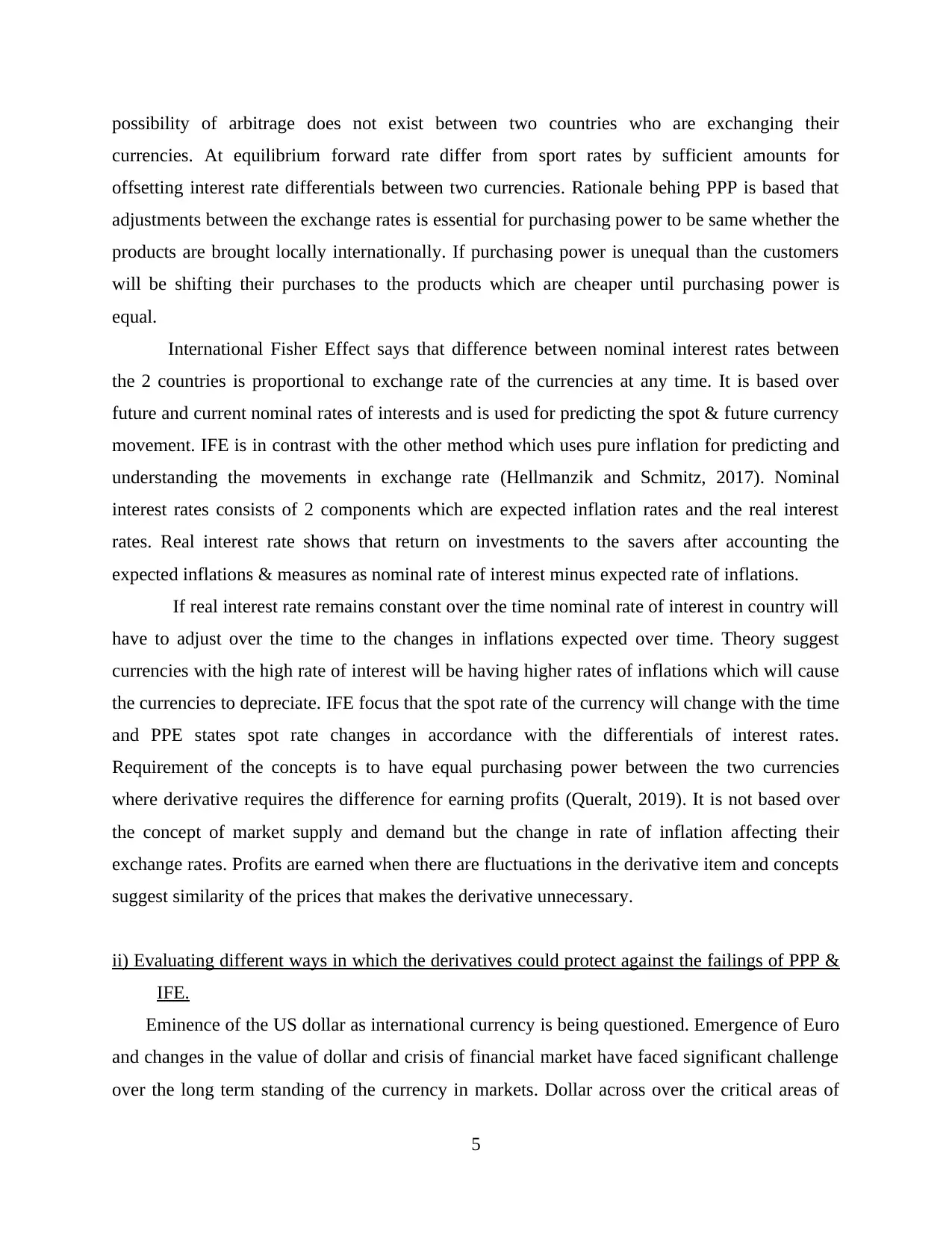
possibility of arbitrage does not exist between two countries who are exchanging their
currencies. At equilibrium forward rate differ from sport rates by sufficient amounts for
offsetting interest rate differentials between two currencies. Rationale behing PPP is based that
adjustments between the exchange rates is essential for purchasing power to be same whether the
products are brought locally internationally. If purchasing power is unequal than the customers
will be shifting their purchases to the products which are cheaper until purchasing power is
equal.
International Fisher Effect says that difference between nominal interest rates between
the 2 countries is proportional to exchange rate of the currencies at any time. It is based over
future and current nominal rates of interests and is used for predicting the spot & future currency
movement. IFE is in contrast with the other method which uses pure inflation for predicting and
understanding the movements in exchange rate (Hellmanzik and Schmitz, 2017). Nominal
interest rates consists of 2 components which are expected inflation rates and the real interest
rates. Real interest rate shows that return on investments to the savers after accounting the
expected inflations & measures as nominal rate of interest minus expected rate of inflations.
If real interest rate remains constant over the time nominal rate of interest in country will
have to adjust over the time to the changes in inflations expected over time. Theory suggest
currencies with the high rate of interest will be having higher rates of inflations which will cause
the currencies to depreciate. IFE focus that the spot rate of the currency will change with the time
and PPE states spot rate changes in accordance with the differentials of interest rates.
Requirement of the concepts is to have equal purchasing power between the two currencies
where derivative requires the difference for earning profits (Queralt, 2019). It is not based over
the concept of market supply and demand but the change in rate of inflation affecting their
exchange rates. Profits are earned when there are fluctuations in the derivative item and concepts
suggest similarity of the prices that makes the derivative unnecessary.
ii) Evaluating different ways in which the derivatives could protect against the failings of PPP &
IFE.
Eminence of the US dollar as international currency is being questioned. Emergence of Euro
and changes in the value of dollar and crisis of financial market have faced significant challenge
over the long term standing of the currency in markets. Dollar across over the critical areas of
5
currencies. At equilibrium forward rate differ from sport rates by sufficient amounts for
offsetting interest rate differentials between two currencies. Rationale behing PPP is based that
adjustments between the exchange rates is essential for purchasing power to be same whether the
products are brought locally internationally. If purchasing power is unequal than the customers
will be shifting their purchases to the products which are cheaper until purchasing power is
equal.
International Fisher Effect says that difference between nominal interest rates between
the 2 countries is proportional to exchange rate of the currencies at any time. It is based over
future and current nominal rates of interests and is used for predicting the spot & future currency
movement. IFE is in contrast with the other method which uses pure inflation for predicting and
understanding the movements in exchange rate (Hellmanzik and Schmitz, 2017). Nominal
interest rates consists of 2 components which are expected inflation rates and the real interest
rates. Real interest rate shows that return on investments to the savers after accounting the
expected inflations & measures as nominal rate of interest minus expected rate of inflations.
If real interest rate remains constant over the time nominal rate of interest in country will
have to adjust over the time to the changes in inflations expected over time. Theory suggest
currencies with the high rate of interest will be having higher rates of inflations which will cause
the currencies to depreciate. IFE focus that the spot rate of the currency will change with the time
and PPE states spot rate changes in accordance with the differentials of interest rates.
Requirement of the concepts is to have equal purchasing power between the two currencies
where derivative requires the difference for earning profits (Queralt, 2019). It is not based over
the concept of market supply and demand but the change in rate of inflation affecting their
exchange rates. Profits are earned when there are fluctuations in the derivative item and concepts
suggest similarity of the prices that makes the derivative unnecessary.
ii) Evaluating different ways in which the derivatives could protect against the failings of PPP &
IFE.
Eminence of the US dollar as international currency is being questioned. Emergence of Euro
and changes in the value of dollar and crisis of financial market have faced significant challenge
over the long term standing of the currency in markets. Dollar across over the critical areas of
5
Paraphrase This Document
Need a fresh take? Get an instant paraphrase of this document with our AI Paraphraser
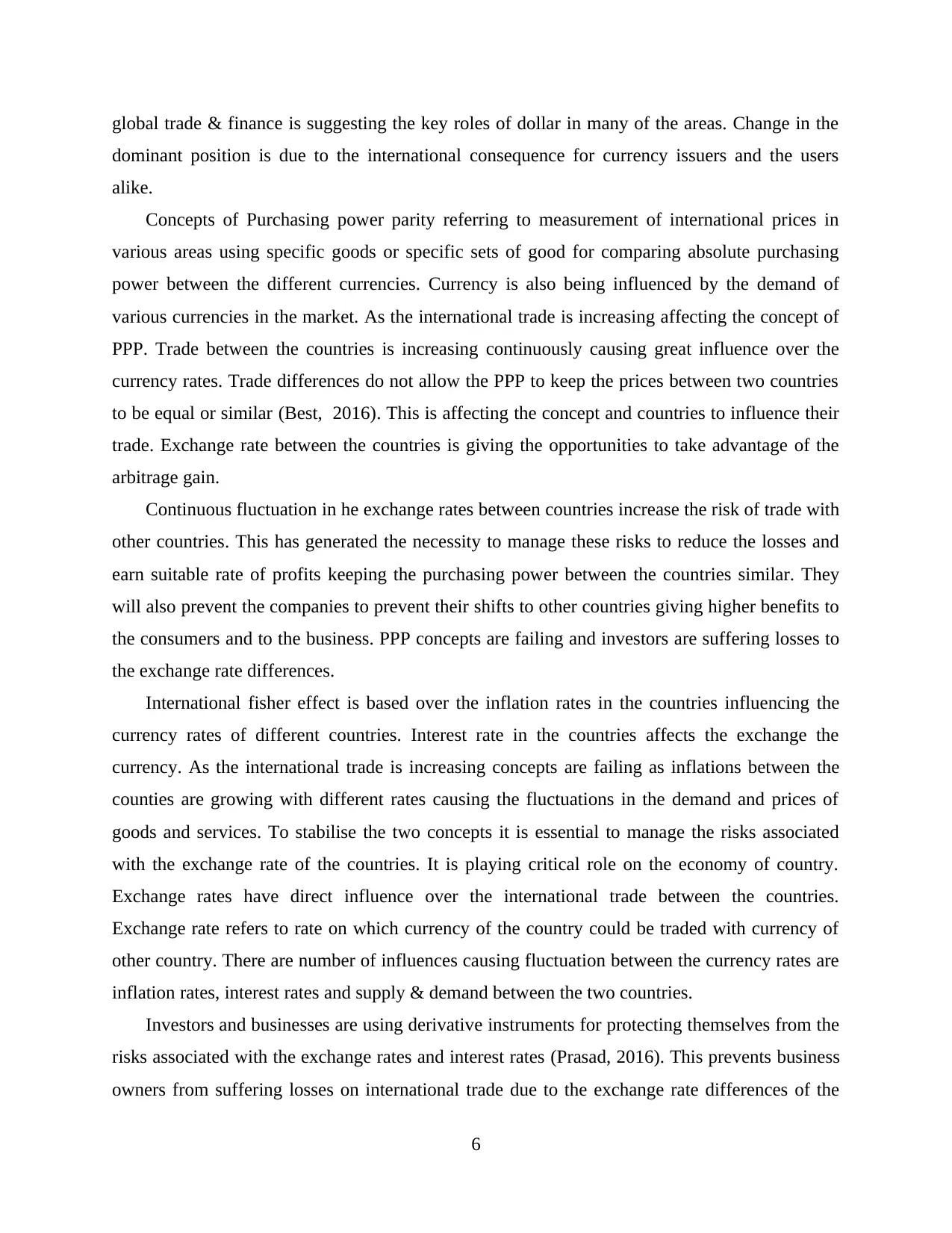
global trade & finance is suggesting the key roles of dollar in many of the areas. Change in the
dominant position is due to the international consequence for currency issuers and the users
alike.
Concepts of Purchasing power parity referring to measurement of international prices in
various areas using specific goods or specific sets of good for comparing absolute purchasing
power between the different currencies. Currency is also being influenced by the demand of
various currencies in the market. As the international trade is increasing affecting the concept of
PPP. Trade between the countries is increasing continuously causing great influence over the
currency rates. Trade differences do not allow the PPP to keep the prices between two countries
to be equal or similar (Best, 2016). This is affecting the concept and countries to influence their
trade. Exchange rate between the countries is giving the opportunities to take advantage of the
arbitrage gain.
Continuous fluctuation in he exchange rates between countries increase the risk of trade with
other countries. This has generated the necessity to manage these risks to reduce the losses and
earn suitable rate of profits keeping the purchasing power between the countries similar. They
will also prevent the companies to prevent their shifts to other countries giving higher benefits to
the consumers and to the business. PPP concepts are failing and investors are suffering losses to
the exchange rate differences.
International fisher effect is based over the inflation rates in the countries influencing the
currency rates of different countries. Interest rate in the countries affects the exchange the
currency. As the international trade is increasing concepts are failing as inflations between the
counties are growing with different rates causing the fluctuations in the demand and prices of
goods and services. To stabilise the two concepts it is essential to manage the risks associated
with the exchange rate of the countries. It is playing critical role on the economy of country.
Exchange rates have direct influence over the international trade between the countries.
Exchange rate refers to rate on which currency of the country could be traded with currency of
other country. There are number of influences causing fluctuation between the currency rates are
inflation rates, interest rates and supply & demand between the two countries.
Investors and businesses are using derivative instruments for protecting themselves from the
risks associated with the exchange rates and interest rates (Prasad, 2016). This prevents business
owners from suffering losses on international trade due to the exchange rate differences of the
6
dominant position is due to the international consequence for currency issuers and the users
alike.
Concepts of Purchasing power parity referring to measurement of international prices in
various areas using specific goods or specific sets of good for comparing absolute purchasing
power between the different currencies. Currency is also being influenced by the demand of
various currencies in the market. As the international trade is increasing affecting the concept of
PPP. Trade between the countries is increasing continuously causing great influence over the
currency rates. Trade differences do not allow the PPP to keep the prices between two countries
to be equal or similar (Best, 2016). This is affecting the concept and countries to influence their
trade. Exchange rate between the countries is giving the opportunities to take advantage of the
arbitrage gain.
Continuous fluctuation in he exchange rates between countries increase the risk of trade with
other countries. This has generated the necessity to manage these risks to reduce the losses and
earn suitable rate of profits keeping the purchasing power between the countries similar. They
will also prevent the companies to prevent their shifts to other countries giving higher benefits to
the consumers and to the business. PPP concepts are failing and investors are suffering losses to
the exchange rate differences.
International fisher effect is based over the inflation rates in the countries influencing the
currency rates of different countries. Interest rate in the countries affects the exchange the
currency. As the international trade is increasing concepts are failing as inflations between the
counties are growing with different rates causing the fluctuations in the demand and prices of
goods and services. To stabilise the two concepts it is essential to manage the risks associated
with the exchange rate of the countries. It is playing critical role on the economy of country.
Exchange rates have direct influence over the international trade between the countries.
Exchange rate refers to rate on which currency of the country could be traded with currency of
other country. There are number of influences causing fluctuation between the currency rates are
inflation rates, interest rates and supply & demand between the two countries.
Investors and businesses are using derivative instruments for protecting themselves from the
risks associated with the exchange rates and interest rates (Prasad, 2016). This prevents business
owners from suffering losses on international trade due to the exchange rate differences of the
6
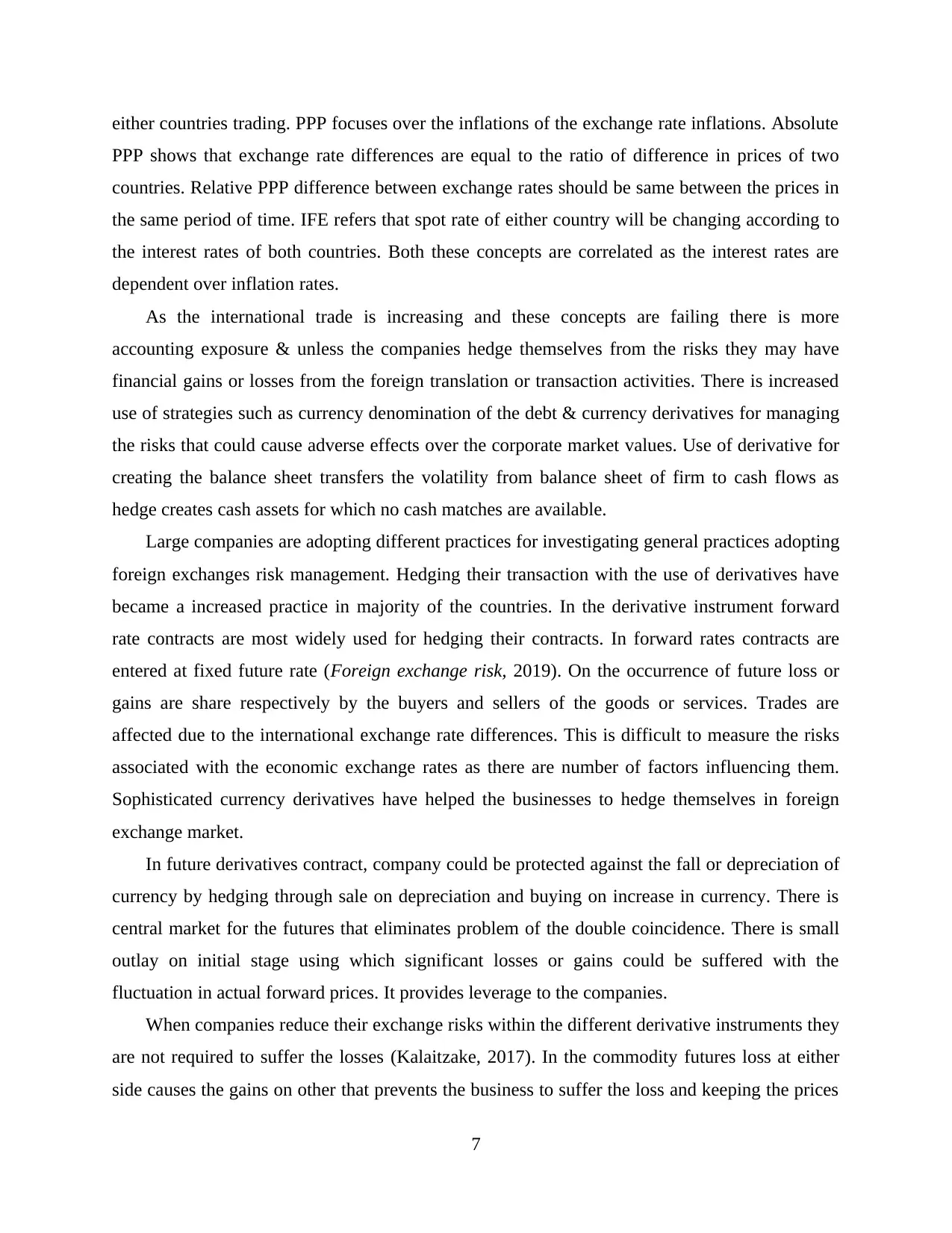
either countries trading. PPP focuses over the inflations of the exchange rate inflations. Absolute
PPP shows that exchange rate differences are equal to the ratio of difference in prices of two
countries. Relative PPP difference between exchange rates should be same between the prices in
the same period of time. IFE refers that spot rate of either country will be changing according to
the interest rates of both countries. Both these concepts are correlated as the interest rates are
dependent over inflation rates.
As the international trade is increasing and these concepts are failing there is more
accounting exposure & unless the companies hedge themselves from the risks they may have
financial gains or losses from the foreign translation or transaction activities. There is increased
use of strategies such as currency denomination of the debt & currency derivatives for managing
the risks that could cause adverse effects over the corporate market values. Use of derivative for
creating the balance sheet transfers the volatility from balance sheet of firm to cash flows as
hedge creates cash assets for which no cash matches are available.
Large companies are adopting different practices for investigating general practices adopting
foreign exchanges risk management. Hedging their transaction with the use of derivatives have
became a increased practice in majority of the countries. In the derivative instrument forward
rate contracts are most widely used for hedging their contracts. In forward rates contracts are
entered at fixed future rate (Foreign exchange risk, 2019). On the occurrence of future loss or
gains are share respectively by the buyers and sellers of the goods or services. Trades are
affected due to the international exchange rate differences. This is difficult to measure the risks
associated with the economic exchange rates as there are number of factors influencing them.
Sophisticated currency derivatives have helped the businesses to hedge themselves in foreign
exchange market.
In future derivatives contract, company could be protected against the fall or depreciation of
currency by hedging through sale on depreciation and buying on increase in currency. There is
central market for the futures that eliminates problem of the double coincidence. There is small
outlay on initial stage using which significant losses or gains could be suffered with the
fluctuation in actual forward prices. It provides leverage to the companies.
When companies reduce their exchange risks within the different derivative instruments they
are not required to suffer the losses (Kalaitzake, 2017). In the commodity futures loss at either
side causes the gains on other that prevents the business to suffer the loss and keeping the prices
7
PPP shows that exchange rate differences are equal to the ratio of difference in prices of two
countries. Relative PPP difference between exchange rates should be same between the prices in
the same period of time. IFE refers that spot rate of either country will be changing according to
the interest rates of both countries. Both these concepts are correlated as the interest rates are
dependent over inflation rates.
As the international trade is increasing and these concepts are failing there is more
accounting exposure & unless the companies hedge themselves from the risks they may have
financial gains or losses from the foreign translation or transaction activities. There is increased
use of strategies such as currency denomination of the debt & currency derivatives for managing
the risks that could cause adverse effects over the corporate market values. Use of derivative for
creating the balance sheet transfers the volatility from balance sheet of firm to cash flows as
hedge creates cash assets for which no cash matches are available.
Large companies are adopting different practices for investigating general practices adopting
foreign exchanges risk management. Hedging their transaction with the use of derivatives have
became a increased practice in majority of the countries. In the derivative instrument forward
rate contracts are most widely used for hedging their contracts. In forward rates contracts are
entered at fixed future rate (Foreign exchange risk, 2019). On the occurrence of future loss or
gains are share respectively by the buyers and sellers of the goods or services. Trades are
affected due to the international exchange rate differences. This is difficult to measure the risks
associated with the economic exchange rates as there are number of factors influencing them.
Sophisticated currency derivatives have helped the businesses to hedge themselves in foreign
exchange market.
In future derivatives contract, company could be protected against the fall or depreciation of
currency by hedging through sale on depreciation and buying on increase in currency. There is
central market for the futures that eliminates problem of the double coincidence. There is small
outlay on initial stage using which significant losses or gains could be suffered with the
fluctuation in actual forward prices. It provides leverage to the companies.
When companies reduce their exchange risks within the different derivative instruments they
are not required to suffer the losses (Kalaitzake, 2017). In the commodity futures loss at either
side causes the gains on other that prevents the business to suffer the loss and keeping the prices
7
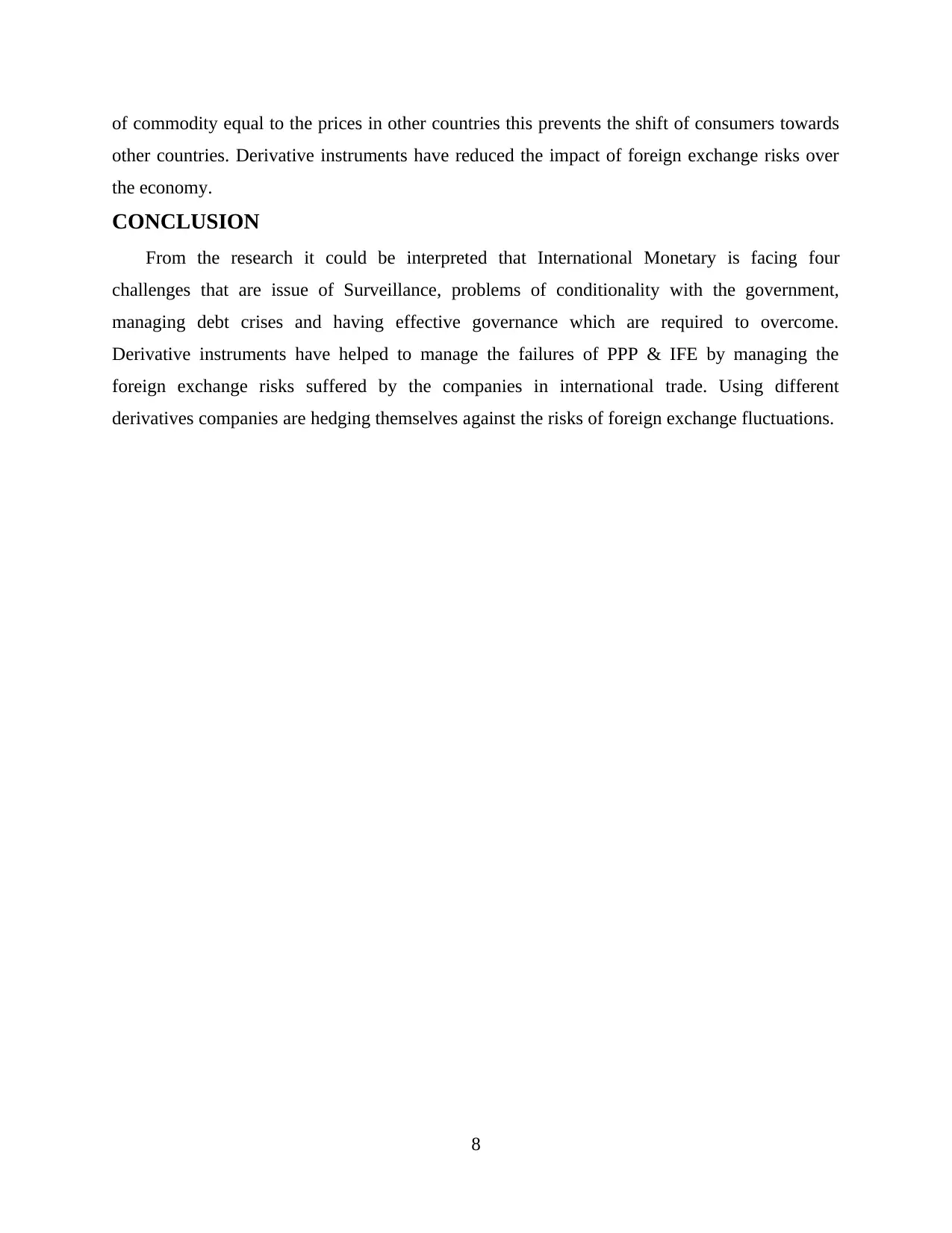
of commodity equal to the prices in other countries this prevents the shift of consumers towards
other countries. Derivative instruments have reduced the impact of foreign exchange risks over
the economy.
CONCLUSION
From the research it could be interpreted that International Monetary is facing four
challenges that are issue of Surveillance, problems of conditionality with the government,
managing debt crises and having effective governance which are required to overcome.
Derivative instruments have helped to manage the failures of PPP & IFE by managing the
foreign exchange risks suffered by the companies in international trade. Using different
derivatives companies are hedging themselves against the risks of foreign exchange fluctuations.
8
other countries. Derivative instruments have reduced the impact of foreign exchange risks over
the economy.
CONCLUSION
From the research it could be interpreted that International Monetary is facing four
challenges that are issue of Surveillance, problems of conditionality with the government,
managing debt crises and having effective governance which are required to overcome.
Derivative instruments have helped to manage the failures of PPP & IFE by managing the
foreign exchange risks suffered by the companies in international trade. Using different
derivatives companies are hedging themselves against the risks of foreign exchange fluctuations.
8
Secure Best Marks with AI Grader
Need help grading? Try our AI Grader for instant feedback on your assignments.
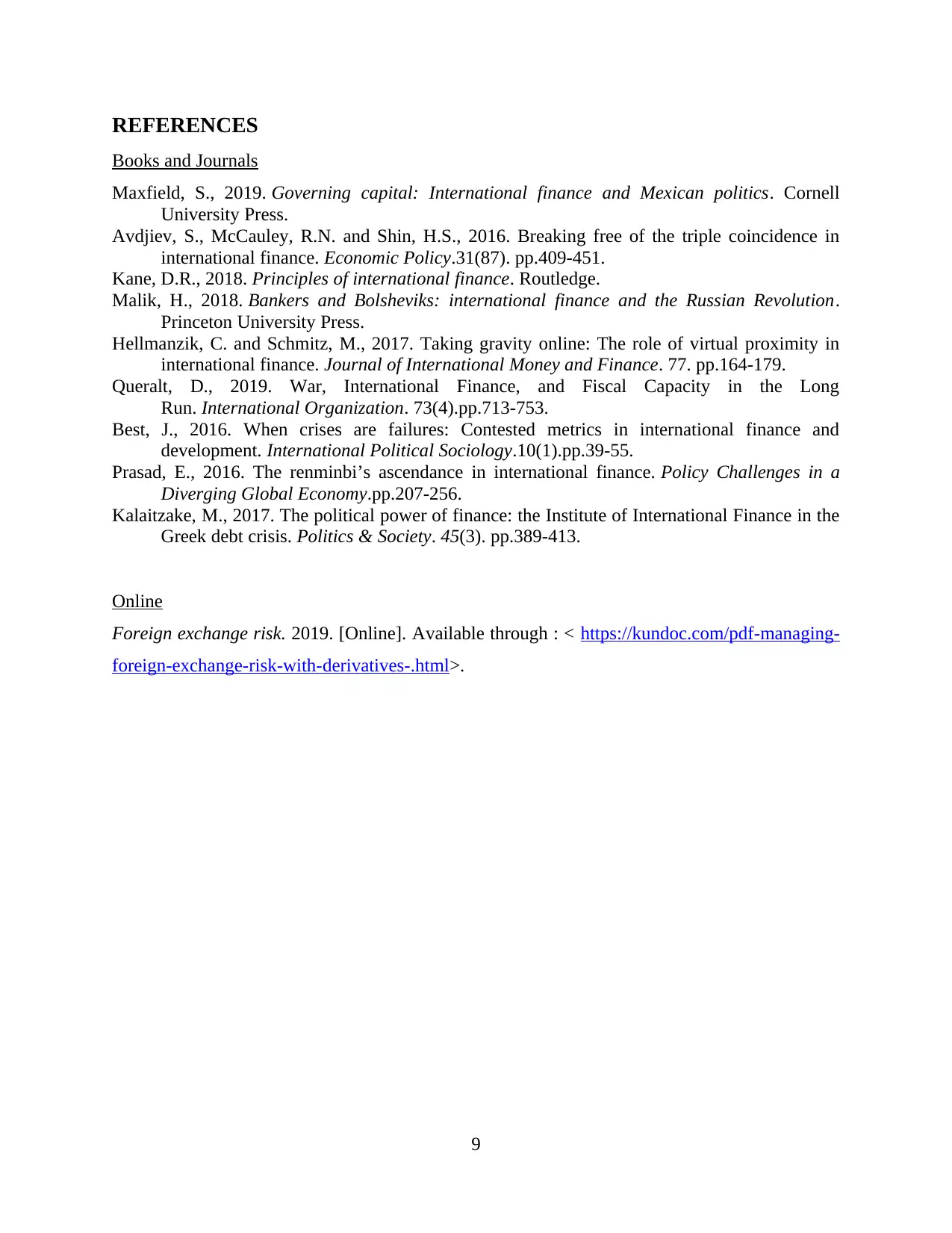
REFERENCES
Books and Journals
Maxfield, S., 2019. Governing capital: International finance and Mexican politics. Cornell
University Press.
Avdjiev, S., McCauley, R.N. and Shin, H.S., 2016. Breaking free of the triple coincidence in
international finance. Economic Policy.31(87). pp.409-451.
Kane, D.R., 2018. Principles of international finance. Routledge.
Malik, H., 2018. Bankers and Bolsheviks: international finance and the Russian Revolution.
Princeton University Press.
Hellmanzik, C. and Schmitz, M., 2017. Taking gravity online: The role of virtual proximity in
international finance. Journal of International Money and Finance. 77. pp.164-179.
Queralt, D., 2019. War, International Finance, and Fiscal Capacity in the Long
Run. International Organization. 73(4).pp.713-753.
Best, J., 2016. When crises are failures: Contested metrics in international finance and
development. International Political Sociology.10(1).pp.39-55.
Prasad, E., 2016. The renminbi’s ascendance in international finance. Policy Challenges in a
Diverging Global Economy.pp.207-256.
Kalaitzake, M., 2017. The political power of finance: the Institute of International Finance in the
Greek debt crisis. Politics & Society. 45(3). pp.389-413.
Online
Foreign exchange risk. 2019. [Online]. Available through : < https://kundoc.com/pdf-managing-
foreign-exchange-risk-with-derivatives-.html>.
9
Books and Journals
Maxfield, S., 2019. Governing capital: International finance and Mexican politics. Cornell
University Press.
Avdjiev, S., McCauley, R.N. and Shin, H.S., 2016. Breaking free of the triple coincidence in
international finance. Economic Policy.31(87). pp.409-451.
Kane, D.R., 2018. Principles of international finance. Routledge.
Malik, H., 2018. Bankers and Bolsheviks: international finance and the Russian Revolution.
Princeton University Press.
Hellmanzik, C. and Schmitz, M., 2017. Taking gravity online: The role of virtual proximity in
international finance. Journal of International Money and Finance. 77. pp.164-179.
Queralt, D., 2019. War, International Finance, and Fiscal Capacity in the Long
Run. International Organization. 73(4).pp.713-753.
Best, J., 2016. When crises are failures: Contested metrics in international finance and
development. International Political Sociology.10(1).pp.39-55.
Prasad, E., 2016. The renminbi’s ascendance in international finance. Policy Challenges in a
Diverging Global Economy.pp.207-256.
Kalaitzake, M., 2017. The political power of finance: the Institute of International Finance in the
Greek debt crisis. Politics & Society. 45(3). pp.389-413.
Online
Foreign exchange risk. 2019. [Online]. Available through : < https://kundoc.com/pdf-managing-
foreign-exchange-risk-with-derivatives-.html>.
9
1 out of 11
Related Documents
Your All-in-One AI-Powered Toolkit for Academic Success.
+13062052269
info@desklib.com
Available 24*7 on WhatsApp / Email
![[object Object]](/_next/static/media/star-bottom.7253800d.svg)
Unlock your academic potential
© 2024 | Zucol Services PVT LTD | All rights reserved.





